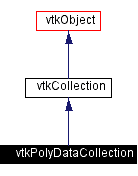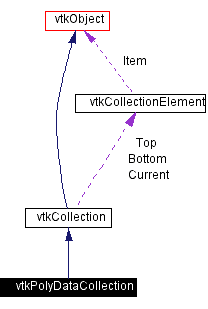vtkPolyDataCollection Class Reference
#include <vtkPolyDataCollection.h>
Inheritance diagram for vtkPolyDataCollection:


Detailed Description
maintain a list of polygonal data objects
- Date:
- 2002/10/04 20:43:44
- Revision:
- 1.39
vtkPolyDataCollection is an object that creates and manipulates lists of datasets of type vtkPolyData.
- See also:
- vtkDataSetCollection vtkCollection
- Created by:
-
- Hoffman, Bill
- Schroeder, Will
- CVS contributions (if > 5%):
-
- Schroeder, Will (53%)
- Martin, Ken (19%)
- Hoffman, Bill (19%)
- Cedilnik, Andy (6%)
- CVS logs (CVSweb):
Definition at line 50 of file vtkPolyDataCollection.h.
Public Types | |
| typedef vtkCollection | Superclass |
Public Methods | |
| virtual const char * | GetClassName () |
| virtual int | IsA (const char *type) |
| void | PrintSelf (ostream &os, vtkIndent indent) |
| void | AddItem (vtkPolyData *pd) |
| vtkPolyData * | GetNextItem () |
Static Public Methods | |
| vtkPolyDataCollection * | New () |
| int | IsTypeOf (const char *type) |
| vtkPolyDataCollection * | SafeDownCast (vtkObject *o) |
Protected Methods | |
| vtkPolyDataCollection () | |
| ~vtkPolyDataCollection () | |
Member Typedef Documentation
|
|
Reimplemented from vtkCollection. Definition at line 54 of file vtkPolyDataCollection.h. |
Constructor & Destructor Documentation
|
|
Definition at line 69 of file vtkPolyDataCollection.h. |
|
|
Definition at line 70 of file vtkPolyDataCollection.h. |
Member Function Documentation
|
|
Construct with empty list. Reimplemented from vtkCollection. |
|
|
Reimplemented from vtkCollection. |
|
|
Return 1 if this class type is the same type of (or a subclass of) the named class. Returns 0 otherwise. This method works in combination with vtkTypeRevisionMacro found in vtkSetGet.h. Reimplemented from vtkCollection. |
|
|
Return 1 if this class is the same type of (or a subclass of) the named class. Returns 0 otherwise. This method works in combination with vtkTypeRevisionMacro found in vtkSetGet.h. Reimplemented from vtkCollection. |
|
|
Reimplemented from vtkCollection. |
|
||||||||||||
|
Methods invoked by print to print information about the object including superclasses. Typically not called by the user (use Print() instead) but used in the hierarchical print process to combine the output of several classes. Reimplemented from vtkCollection. |
|
|
Add a poly data to the list. Definition at line 59 of file vtkPolyDataCollection.h. References vtkCollection::AddItem(). |
|
|
Get the next poly data in the list. Definition at line 65 of file vtkPolyDataCollection.h. References vtkCollection::GetNextItemAsObject(). |
The documentation for this class was generated from the following file:
- Filtering/vtkPolyDataCollection.h